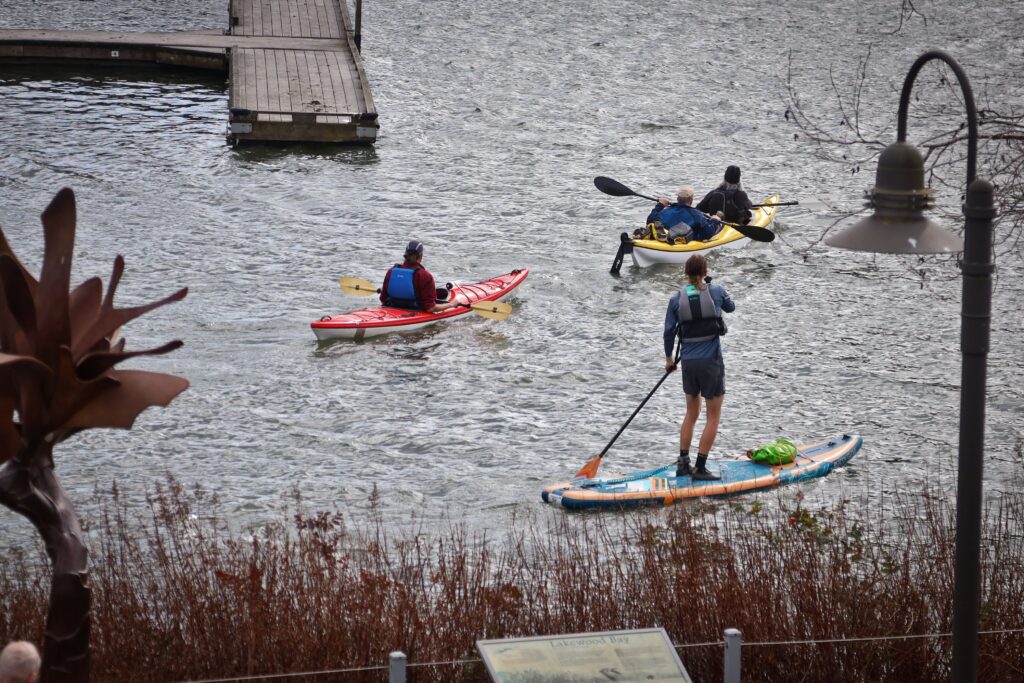The moneyed suburb and private corporation that once maintained Oswego Lake’s status as a gated domain must pay the legal fees of the
lawyers who won public access,
a judge ruled Friday.
Clackamas County Circuit Judge Kathie Steele
split the $1.5 million bill three ways
— with the Lake Oswego Corporation footing 45% of the bill and City Hall on the hook for more than a third.
That equates to a $677,000 tab for the corporation and a $527,000 obligation for the city.
Steele found Oregon liable for the remaining 20% of the fees, or $300,0000, noting that state lawyers supported the city’s stance for the first half of the 13-year-long legal battle.
Lake Oswego swimmer and public access plaintiff Todd Prager — who does not own lakefront property or an easement that would have granted him lake access under the old rules — hailed the news. He said the attorneys at Sugerman Dahab worked without pay and spent $200,000 on expert witnesses.
“They significantly advanced the public interest,” Prager said Tuesday. “And fortunately, they were awarded fees.”
The latest
ruling
comes after Steele in March ordered the city to remove “no trespassing” signs and allow public access from one lakeside park. The
Lake Corporation is appealing
the landmark decision, but the Lake Oswego
City Council voted not to join.
Since that vote, both city and corporation attorneys have argued they shouldn’t be held liable for the other side’s
legal fees
, arguing variously that the plaintiffs didn’t actually succeed on most of their arguments, or that what they won was of no benefit.
Paul Conable, an attorney hired by the city, said the municipality had been “caught in the middle” and played only a bit part in the litigation.
Steele disagreed, saying the city council banned public access in a unanimous resolution passed in 2012 and never overturned it.
“The city used the resolution as a ‘sword’ to keep people out of the lake,” Steele wrote. “Then, the city used the resolution as a ‘shield’ to avoid the consequences of their actions.”
The city spent at least $1 million on the litigation, while the Lake Corporation’s fees have been filed under seal.
A deadline still looms in the case: Steele has given the city until June 25 to remove a set of bronze reeds installed in the water near the
sole public access point
at Millennium Plaza Park.
The reed-like statute and a ring of boulders was installed in 2005 to “create a barrier to keep
unauthorized boats
from using the plaza steps as access to the lake,” according to a recollection later published by the artist, Mark Sells.
It’s unclear if the city will meet the
deadline for removal
. Spokespeople for the city and Lake Corporation didn’t immediately respond to a request for comment.
In a statement, Lake Oswego Mayor Joe Buck said sticking with the legal process was worth it, if only to get a clearcut ruling — instead of being stuck in a never-ending debate.
“No one enjoys paying their own lawyer, let alone another party’s, but we needed this judicial process,” he said. “We needed the finality this process delivers so that we can move forward and continue focusing on the issues important to our residents.”
The Oregon Marine Board is monitoring conditions on Oswego Lake this summer to see if site-specific rules are needed.
Signs posted by the city restrict public access to daylight hours. Life vest or buoy use is required and only non-motorized watercraft under 18-feet in length are allowed, such as kayaks, paddleboards and inflatables.
The city will post a park ranger at the plaza through Oct. 31.
—Zane Sparling covers breaking news and courts for The Oregonian/OregonLive. Reach him at 503-319-7083,
zsparling@oregonian.com
or
@pdxzane
.
More Legal Coverage
-
Oregon, dozens of other states sue to block sale of 23andMe genetic data
-
Oregon teen held in dirty isolation cell for 32 days, lawsuit claims
-
Portland City Council unanimously votes to increase settlement payment in displacement lawsuit
-
Grocery Outlet boasts prices cheaper than ‘elsewhere.’ A new lawsuit says it’s misleading customers
-
Black Portland fire inspector awarded $275K for workplace discrimination





More Stories
Public access foes ordered to pay hefty legal fees to victors in Oswego Lake case
Public access foes ordered to pay hefty legal fees to victors in Oswego Lake case
Public access foes ordered to pay hefty legal fees to victors in Oswego Lake case